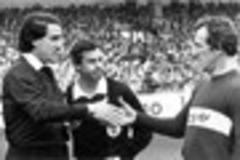 This is Nottingham --
This is Nottingham --I REMEMBER thinking something wasn't right.
Sat in complete silence alongside my Forest team-mates in the away dressing-room in Anderlecht's Astrid Park Stadium, I felt something wrong had just taken place, but I didn't know what. None of us did.
The last thing on my mind was the match had been fixed, the referee had been bribed.
Maybe it was because I was brought up to be honest that I thought – and still do think – the best of everybody and I just couldn't comprehend that terrible possibility.
A referee bribed in a UEFA Cup semi final? No way. Not a chance. Absolutely not. There is no way that would ever happen. Not in the beautiful game, the game I love. But he had.
The gaffer was the first to twig.
Our dressing room door was open and it was situated opposite the ref's room and Cloughie had seen Anderlecht officials going in and out of there, but we couldn't prove anything and we were out of Europe.
It wasn't until 1997 that they finally admitted we'd been cheated, that they'd paid Spanish ref Emilio Guruceta Muro £20,000.
It still rankles with me now, almost 30 years on from that fateful game in 1984.
I actually had to commentate on Anderlecht against Olympiakos in the Champions League on Tuesday night and have done a few more times in the past and their name always sticks in my throat.
It also makes me sick to my stomach that their stadium is named after the guy who bribed the referee all those years ago, Constant Vanden Stock.
How can that be right?
Leading 2-0 after the first leg at the City Ground, thanks to a couple of goals from Steve Hodge, we went to Belgium believing we were going to reach the final only to lose 3-0 in the second leg in what must still be one of the most controversial games of football ever.
I can still see Paul Hart rising to score a free header from a corner – a perfectly good goal – only for it to be disallowed by the ref.
And it was – and still is – for people like Harty that I felt mostly sorry for because I had won a couple of European Cups only a few years earlier, but for players like him a UEFA Cup final would have represented the chance to win a medal in Europe and they were cheated out of it.
We would have played Tottenham in the final as well, and what an all-English showpiece that would have been.
I don't think my feelings will ever go away and they've been brought back to the surface this week with allegations of spot-fixing in English Football.
On the same day as the world's best players Cristiano Ronaldo, Lionel Messi and Franck Ribery were shortlisted for the 2013 Ballon d'Or, I – and I'm sure all fans of the game – were hearing of players being arrested for alleged spot-fixing in Football League games.
Talk about the best and the worst of the game.
Instead of celebrating the greatest players in the modern game, which we certainly should be, English football was being dragged through the mud.
I would never have done anything like it when I was a player – it's not in my make up.
I was living my dream, I'd gone from laying floors to winning European Cups with Forest.
I could have been absolutely skint, but I would still never have done anything to bring shame on myself, my family and the game I loved – and still love today and will do forever.
For me, there's only one way to deal with anyone found guilty of spot-fixing or match fixing and that's to ban them. Not for a season, not for five years, not for ten years, but for life.
Anyone found guilty of such terrible things should never play the game again. They wouldn't deserve a second chance.
Life bans is the only way for football to send out a strong message that it will not tolerate corruption.
It took 13 years for Anderlecht to admit they'd cheated us out of a European final and even then they escaped any punishment as UEFA tried to ban them from Europe for a year only for that to be scandalously overturned.
Any punishment dished out to anyone found guilty of fixing in football today must be a hell of a lot swifter – and harsher. Reported by This is 6 hours ago.